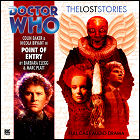 A strange, scream-like signal from a rogue asteroid leads the Doctor to send a response, which only has the effect of making the asteroid stop and change course toward the TARDIS. To avoid a colliskion, the Doctor dematerializes the TARDIS and arrives in 16th century London, where the strange screaming sound can still be heard. The Doctor and Peri find themselves at a nearby inn with none other than playwright Christopher Marlowe, who is sorting through strange – and possibly unearthly – ideas for a play about Dr. Faustus. Marlowe has been consorting with a Spaniard named Velez, rarely seen in public due to his skin’s habit of falling away from his skeleton, and claims that Velez has shown him the secrets of astral projection, giving him glimpses of unearthly events that now inspire his work. The Doctor suspects that Velez is putting Marlowe under some unearthly influence, and tries to cast doubt on Marlowe’s reliability as a spy for the British government. The accusation only lands the Doctor in the Tower of London, while Peri and one of Marlowe’s actors try to free the playwright from the influence of Velez. When they learn that Velez draws his power from blood sacrifices, they become fast candidates to be Velez’ next victim.
A strange, scream-like signal from a rogue asteroid leads the Doctor to send a response, which only has the effect of making the asteroid stop and change course toward the TARDIS. To avoid a colliskion, the Doctor dematerializes the TARDIS and arrives in 16th century London, where the strange screaming sound can still be heard. The Doctor and Peri find themselves at a nearby inn with none other than playwright Christopher Marlowe, who is sorting through strange – and possibly unearthly – ideas for a play about Dr. Faustus. Marlowe has been consorting with a Spaniard named Velez, rarely seen in public due to his skin’s habit of falling away from his skeleton, and claims that Velez has shown him the secrets of astral projection, giving him glimpses of unearthly events that now inspire his work. The Doctor suspects that Velez is putting Marlowe under some unearthly influence, and tries to cast doubt on Marlowe’s reliability as a spy for the British government. The accusation only lands the Doctor in the Tower of London, while Peri and one of Marlowe’s actors try to free the playwright from the influence of Velez. When they learn that Velez draws his power from blood sacrifices, they become fast candidates to be Velez’ next victim.
written by Barbara Clegg & Marc Platt
directed by John Ainsworth
music by Steve FoxonCast: Colin Baker (The Doctor), Nicola Bryant (Peri), Matt Addis (Kit Marlowe), Luis Soto (Velez), Sean Connolly (Iguano / Captain Garland), Tam Williams (Tom), Gemma Wardle (Alys), Ian Brooker (Sir Francis Walsingham)
Notes: Marlowe was a contemporary of Shakespeare, though Shakespeare did his most famous works after Marlowe’s peak of popularity, so there are probably no other Doctors around to hear the ominous screaming sound (The Shakespeare Code, City Of Death). In real life, Marlowe’s second career as a British spy has never been confirmed (or, for that matter, officially denied), but is strongly inferred from Marlowe’s extensive travels, which could not have been paid for on a writer’s wage, even with the patronage of the Queen herself. The latter part of the Latin phrase “ubi desinit philosophus, ibi incipit medicus,” translated in the closing scenes as “where the philosopher leaves off, the doctor begins,” is more accurately translated “the physician begins,” a reference to Marlowe’s character of Dr. Faustus rather than to a certain Time Lord. Point Of Entry was written by Barbara Clegg (Enlightenment) for season 23, and even after the fiasco precipitated by Michael Grade’s attempt to cancel the series, she was asked to rework it back into the more familiar four-25-minute-episode format. When the Trial Of A Time Lord structure was devised, Point Of Entry and other scripts under development were scrapped.
Timeline: after Paradise Five and before Song Of The Megaptera
LogBook entry and TheatEar review by Earl Green
Review: An intriguing historical tale that could serve as the basis for a cracking episode of modern Doctor Who, Point Of Entry makes good use of Christopher Marlowe, and in the process it bends and breaks no more known historical facts about him than, say, The Shakespeare Code does about Shakespeare. The characters of Velez and his dwarf servant are truly disturbing, as are many of the scenes involving them; the cast of Point Of Entry is simply superb.
If there’s a problem with getting to the Point, it’s all about pacing – this story could probably have been compressed to a single episode, which suddenly makes it prime material for the current shape of the television series. With the ease of modern makeup and effects, visualizing Velez’ gruesome face would be easy, and it’d probably scare the kids behind the sofa in a flash (as it should be with Doctor Who!).
Had Point Of Entry been produced in the 1980s, with a script resembling this audio adaptation, this could easily have been one of the better-regarded stories of the sixth Doctor’s brief reign. It’s already among the better Lost Stories.
